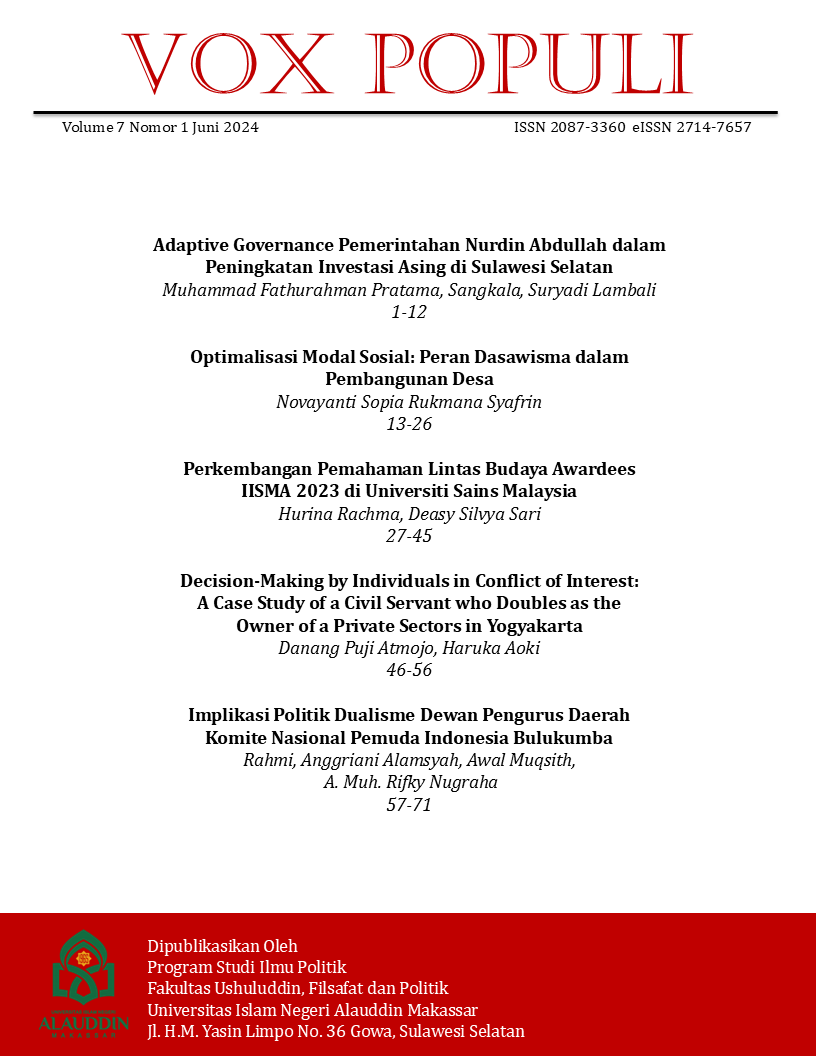Decision-Making by Individuals in Conflict of Interest: A Case Study of a Civil Servant who Doubles as the Owner of a Private Sectors in Yogyakarta
Abstract
This study aims to analyze the conflict of interest experienced by individual employees of government agencies in the Special Region of Yogyakarta who are active in private art institutions. The theoretical framework used in the research includes the concept of conflict of interest and decision-making theory. The research method used is an interpretative phenomenological approach that focuses on describing and interpreting the direct subjective experiences of individuals related to the phenomenon of conflict of interest. Data were obtained through direct interviews with the interviewees, who are former civil servants in a Yogyakarta government agency and owners of private cultural studios. The results show that the Special Fund allocated has had a significant impact on the development of arts and culture in Yogyakarta, but has also resulted in conflict of interest issues among individuals who play multiple roles. The conclusions of the study highlight the importance of clear legal regulations related to conflict of interest as well as the need for a deeper understanding of ethics and public duty for individuals who play a role in both sectors.
References
Frechette, J., Bitzas, V., Aubry, M., Kil-patrick, K., & Lavoie-Tremblay, M. (2020). Capturing Lived Expe-rience: Methodological Considera-tions for Interpretive Phenomeno-logical Inquiry. International Journal of Qualitative Meth-ods, 19, 1-12.
Hasbiansyah, O. (2008). Pendekatan Fenomenologi: Pengantar Praktik Penelitian dalam Ilmu Sosial dan Komunikasi. Mediator: Jurnal Komunikasi, 9(1), 163–180.
Helleringer, G. (2021). Conflict of Interest and Decision Making. In S. G. Hacker, Theories of Choice: The Social Science and the Law of Decision Making (pp. 265-282). Oxford: Oxford University Press.
Nikolov, N. (2013). Conflict of Interest in European Public Law. Journal of Financial Crime, 20(4), 406-421.
Lau, R. R., & Redlawsk, D. P. (2023). Political Decision-Making. In L. Huddy, D. O. Sears, J. S. Levy, & J. Jerit (Eds.), The Oxford Handbook of Political Psychology (3rd ed., pp. 150–190). New York: Oxford University Press.
Rolando, O. (2022). Conflict of Interests in Public Sector. In A. Farazmand, Global Encyclopedia of Public Administration, Public Policy, and Governance (pp. 2330–2334). Florida: Springer.
Olson, S., Berger, A. C., & Beachy, S. H. (Eds.). (2014). Conflict of Interest and Medical Innovation: Ensuring Integrity While Facilitating Innovation in Medical Research: Workshop Summary. Washington. DC: National Academies Press.
Whitton, H. B. (2005). Managing conflict of interest in the public sector: A toolkit. Paris: Organisation for Economic Co-operation and Development.
Website
Kusnandar, V. B. (2022, February 6). Ekonomi DI Yogyakarta Terkecil di Pulau Jawa pada 2021. From Databoks: https://databoks.katadata.co.id/datapublish/2022/02/16/ekonomi-di-yogyakarta-terkecil-di-pulau-jawa-pada-2021
Pandangan Jogja. (2023, August 30). Danais DIY Naik dari Rp 231 Miliar Jadi Rp 1,42 Triliun dalam 10 Tahun. From Pandangan Jogja: https://kumparan.com/pandangan-jogja/danais-diy-naik-dari-rp-231-miliar-jadi-rp-1-42-triliun-dalam-10-tahun-215lbX4hCuh
Pemerintah Indonesia. (2004). PP No. 42 Tahun 2004. Jakarta: Pemerintah Pusat. From Database Peraturan JDIH BPK:
http://peraturan.bpk.go.id/Details/66185/pp-no-42-tahun-2004
Sedayu, A. (2023, January 22). Kemiskinan dan Ketimpangan di Yogyakarta Tinggi, Ekonom Ungkap Penyebabnya. From Tempo.com: https://bisnis.tempo.co/read/1682597/kemiskinan-dan-ketimpangan-di-yogyakarta-tinggi-ekonom-ungkap-penyebabnya
SMP Negeri 15 Yogyakarta. (2023, September 7). SMPN 15 Yogyakarta Selanggarakan Workshop Peningkatan Kinerja Visi dan Misi Sekolah. From SMP Negeri 15 Yogyakarta:
Interview
Retired Civil Servant (2024, May 14). Yogyakarta City, the Special Region of Yogyakarta
Copyright (c) 2024 Danang Puji Atmojo, Haruka Aoki

This work is licensed under a Creative Commons Attribution-NonCommercial-ShareAlike 4.0 International License.
Vox Populi uses license CC-BY-NA-SA or equivalent license as the optimal license use for publication, distribution, use, and reuse of scientific works. To see the rules, you can look here; Indonesia or English.











